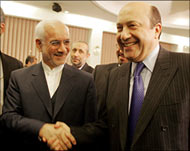Consensus on reporting Iran to UN
The United States and the three European countries – Britain, France and Germany – have agreed with Russia and China on a compromise proposal to report Iran to the UN Security Council over its nuclear programme.

In a joint statement on Monday, the six countries also said the UN nuclear watchdog “should report to the Security Council its decision on the steps required of Iran”.
But they have also decided to put off UN action until at least March, the joint statement said.
They “agreed that the Security Council should await the International Atomic Energy Agency’s (IAEA) report to the March meeting of the IAEA board… before deciding to take action to reinforce the authority of the IAEA process”, the statement said.
The Security Council can issue warnings or impose sanctions as part of a range of punitive measures in its role as an enforcement body, unlike the IAEA which has no such powers and has been investigating the Iranian nuclear programme for three years.
Iran protests
 |
|
Aghazadeh (L): Thereis no legal |
Meanwhile, Iran‘s top nuclear official said on Tuesday that moves to send Iran‘s case to the United Nations Security Council were not legally justified.
“There is no legal basis to refer Iran‘s case to the Security Council and the Europeans will face difficulties doing so,” Gholamreza Aghazadeh, head of Iran‘s Atomic Energy
Organisation, said in an interview with the semi-official ISNA students news agency.
“I still believe that a diplomatic solution can be found to get out of this crisis,” he added.
Iran says its nuclear programme is a peaceful effort to generate electricity, but Europe and the United States believe it may be a cover for developing atomic weapons.
A senior US State Department official said that for the first time in the Iranian nuclear crisis all five permanent members of the UN Security Council – Britain, China, France, Russia and the United States – and Germany are sending exactly the same message to Iran.
Russian stand
Russia has in the past opposed taking Iran to the Security Council, as it seeks a diplomatic solution to protect its extensive trade and security interests in Iran.
“This has never happened in the history of the Iranian crisis” |
“This has never happened in the history of the Iranian crisis,” the official said of the P-5 unity.
He said the US goal was to get the Iranian nuclear dossier to the Security Council, which has enforcement powers unlike the IAEA.
“In diplomacy, you take one step at a time. The real issue was getting to the Security Council,” the official said.
He said Condoleezza Rice, the US secretary of state, had gone into dinner with the five other nations feeling “that Iran had to be referred to the UN Security Council, that temporising had gone on for too long”.
The joint statement also “called on Iran to restore in full the suspension of enrichment-related activity, including R & D under the supervision of the IAEA”.
Diplomatic route
Philippe Douste-Blazy, the French foreign minister, said he and his colleagues “wished that a firm message from the international community be sent in a united fashion to the Iranian authorities, who must understand that they must suspend nuclear activities”.
 |
|
Rice had said Iran’s response to |
“The diplomatic route, which is the better way to proceed, can then resume,” Douste-Blazy told a late-night meeting with French reporters in London after the four-hour conclave where, according to diplomatic sources, Russia proved the most reluctant to take firm action.
Rice had said earlier that Iran‘s response to diplomatic efforts to reach a compromise was not good enough and that it was playing for time.
“I think we’ve had our answer from the Iranian government. It’s not a very satisfactory one,” Rice told a press conference.
Last September, the IAEA found Tehran in non-compliance with the nuclear Non-Proliferation Treaty (NPT) for hiding nuclear work for almost two decades.
It called on Iran to suspend all work on making nuclear fuel, as this can also produce atom bomb material, and to cooperate with a three-year-old IAEA investigation.
But while a finding of non-compliance requires referring the matter to the Security Council, the IAEA board of governors put off such a report to give Iran time to comply with its demands.
Iran then set off the latest crisis on 10 January when it broke IAEA seals on enrichment equipment.